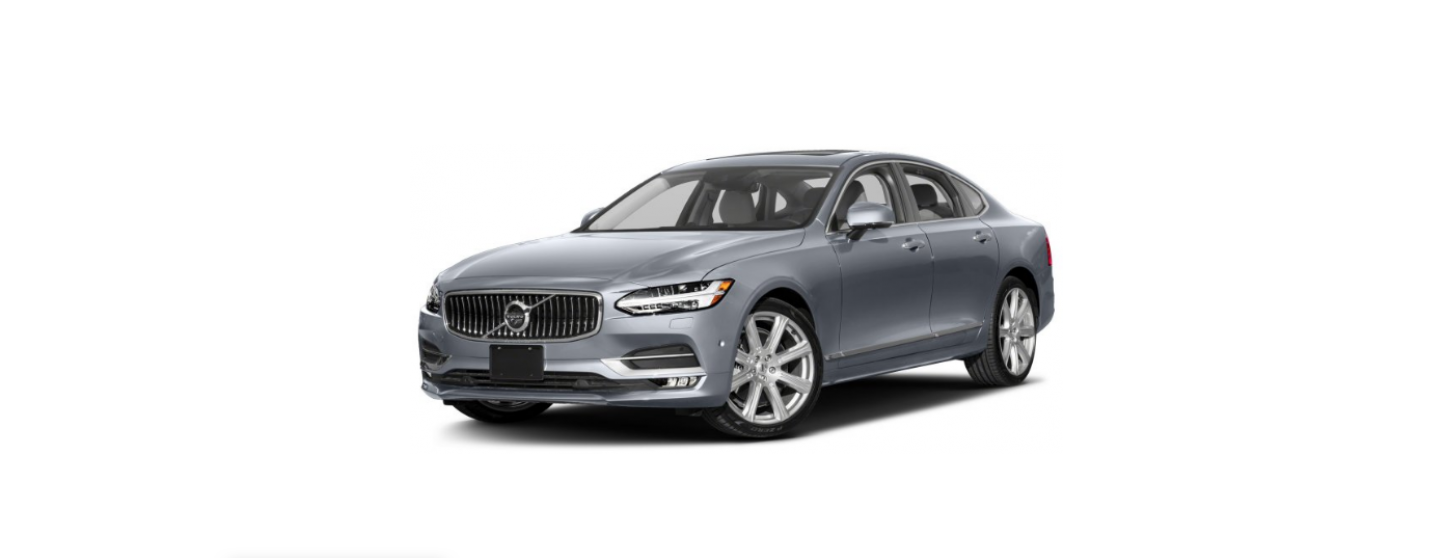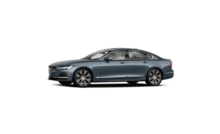- Do not affix any objects, tape, or decals in the areas described below.
- Clean camera lenses regularly with lukewarm water and car shampoo – be careful not to scratch the lenses.
- Do not install auxiliary lamps or similar in the grille as this can affect the performance of the front radar unit.
Radar unit locations
Location of the parking sensors
Dirt, ice, and snow covering the sensors may cause incorrect warning signals, and reduced or no function.
Camera location
Maintenance of driver support components must only be performed at a workshop – an authorized Volvo workshop is recommended.
Symbols and messages for camera and radar units
Detector blocked
If the driver display shows this symbol and a message, this means that the camera and radar units cannot detect other vehicles, cyclists, pedestrians, and large animals in front of the car and that the car’s camera-based and radar-based functions may be disrupted. The following table presents examples of possible causes for a message being shown, along with the appropriate action:
| Cause | Action |
|---|---|
| The surface area in front of the radar unit is dirty or covered with ice or snow. | Clean the surface area in front of the radar unit from dirt, ice, and snow. |
| The windscreen surface in front of the camera unit is dirty or covered with ice or snow. | Clean dirt, ice, and snow from the windscreen surface in front of the camera unit. |
| Thick fog and heavy rain or snow block the radar signals or the camera view. | No action. Sometimes the unit does not work during heavy rain or snowfall. |
| Water or snow from the road surface swirls up and blocks the radar signals or camera view. | No action. Sometimes the unit does not work on a very wet or snow-covered road surface. |
| Strong incoming light | No action. The camera unit is reset automatically in more favorable light conditions. |
Limitations for camera and radar units
Common limitations for camera and radar
The camera and radar are aids for intelligent driving that cannot be called upon to achieve intelligent driving, and the necessary safety management must be implemented in order to avoid road safety risks or accidents caused by the driver’s incorrect use of the camera and radar.
Blocked unit
Do not position, stick, or install anything in front of or around the camera and radar units – this may disrupt camera and radar-based functions. This may result in functions being reduced, being switched off completely, or giving incorrect function responses.
Damaged windscreen
The following rules are also applicable when a camera is fitted to the windscreen:
- If a scratch, crack or stone chip appears in front of the unit and covers an area of approx. 0.5 × 3.0 mm (0.02 × 0.12 inches) or more, a workshop must be contacted so that the windscreen can be replaced.
- Volvo recommends not repairing cracks, scratches, or stone chips in the area in front of the unit – the entire windscreen should be replaced instead.
- Before replacing a windscreen, contact a workshop to verify that the correct windscreen has been ordered and will be fitted.
- The same type of windscreen wipers or windscreen wipers approved by Volvo must be fitted when the windscreen is replaced.
- When replacing the windscreen, the camera unit must be recalibrated by a workshop to ensure the functionality of all the camera-based systems in the car.
If not rectified, it can lead to reduced performance for the driver support systems that use the camera and/or radar units. This may result in functions being reduced, being switched off completely, or giving incorrect function responses.
Further limitations for radar
Vehicle speed
The radar unit’s ability to detect a vehicle ahead is greatly reduced if the speed of the vehicle ahead is very different from the speed of your own car.
Limited field of vision
The radar unit has a limited field of vision. In some situations, another vehicle is not detected, or the detection is made later than expected.
- Sometimes the radar unit is late at detecting vehicles at close distances – e.g. a vehicle that drives in between your car and the vehicle ahead.
- Small vehicles, such as motorcycles, or vehicles not driving in the center of the lane can remain undetected.
- In bends, the radar unit may detect a different vehicle than intended or lose a detected vehicle from view.
Reduced function
In the event of heavy rain or slush or ice on the emblem, radar unit functions may be reduced, completely deactivated, or give an incorrect function response.
Further limitations for camera
Impaired vision
The cameras have limitations similar to the human eye, i.e. may “see” worse for example intense snowfall or rain, dense fog, heavy dust storms, and snow flurries. Under such conditions, the functions of camera-dependent systems could be significantly reduced or temporarily disengaged. Strong oncoming light, reflections in the carriageway, snow or ice on the road surface, dirty road surfaces, or unclear lane markings can also significantly reduce camera function when it is used to scan the carriageway to detect pedestrians, and cyclists, large animals, and other vehicles. Bicycle racks or other accessories mounted at the rear of the car may obscure the camera’s view.
Further limitations for Park assist camera
Blind sectors
Pay attention to the possibility that, even if it only looks like a relatively small part of the image is obscured, a relatively large sector could be hidden from view. An obstacle could thereby go undetected until the car is very close to it.
Light conditions
The camera image is adjusted automatically according to prevailing light conditions. Because of this, the image may vary slightly in brightness and quality. Poor light conditions can result in reduced image quality.
Camera unit
The camera unit is used for the following functions:
- Pilot Assist
- Lane assistance
- Assistance at risk of collision
- Driver Alert
- Road Sign Information
- Active main beam
- Park Assist
- Ready to drive notification
Do not attempt to access the camera using sharp or foreign objects through the air vents as this may damage the equipment.
Radar units
- Modifying radar units may make them illegal to use.
- Do not install auxiliary lamps or similar in front of the grille as this can affect the function of the radar unit.
Type approval for a radar device
| Market | PA | BLIS | Symbol | Type approval |
|---|---|---|---|---|
| Botswana | ✓ | | BOCA/TA2019/4981 | |
| ✓ | BOCA/TA/2017/3372 | |||
| Brazil | ✓ | | Este equipamento não tem direito à proteção contra interferência prejudicial e não pode causar interferência em sistemas devidamente autorizados. 06354-19-12386 | |
| ✓ | Este equipamento não tem direito à proteção contra interferência prejudicial e não pode causar interferência em sistemas devidamente autorizados. 03563-17-05364 | |||
| Europe | ✓ | | Hereby, Veoneer US, Inc. declares that the radio equipment type 77V12FLR is in compliance with Directive 2014/53/EU. Operational frequency band: 76-77 GHz Maximum Output Power: <55dBm EIRP The full text of the EU declaration of conformity is available at the following internet address: https://www.veoneer.com/en/regulatory Manufacturer: Veoneer US, Inc. 26360 American Drive Southfield, MI 48034 USA Phone: +1-248-223-0600 | |
| ✓ | Hereby, Hella KgaA Hueck & Co. Declares that the radio equipment type RS4 is in compliance with Directive 2014/53/EU. The full text of the EU declaration of conformity is available at the following internet address: www.hella.com/vcc. Technical information: Frequency range: 24.05 … 24.25 GHz Transmission power: 20 dBm (maximum) EIRP Manufacturer and Address: Manufacturer: Hella KGaA Hueck & Co. Address: Rixbecker Straße 75, 59552 Lippstadt, Germany | |||
| The United Arab Emirates (UAE) | ✓ | | REGISTERED No: ER72325/19 DEALER No: 0020858/10 | |
| ✓ | Registered No: ER53878/17 Dealer No: DA44932/15 | |||
| Ghana | ✓ | NCA Approved: ZRO-1H-7E3-145 | ||
| ✓ | NCA Approved: 1R3-1M-7E1-0B7 | |||
| Indonesia | ✓ | Certificate number: 50459/SDPPI/2017 Country of origin Germany Certificate number: 53578/SDPPI/2017 Country of origin China PLG ID: 6051 | ||
| Japan | ✓ | | This device is granted pursuant to the Japanese Radio Law under the grant ID n°: R 215-JRA003 This device should not be modified (otherwise the granted designation number will become invalid). 本製品は、電波法に基づく特定無線設備の技術基準適合証明などを 受けております。 認証番号: R 215-JRA003 本製品の改造は禁止されています。(適合証明番号などが無効とな ります。 ) | |
| ✓ | This device is granted pursuant to the Japanese Radio Law under the grant ID n°: R 204-750001 This device should not be modified (otherwise the granted designation number will become invalid). 本製品は、電波法に基づく特定無線設備の技術基準適合証明などを 受けております。 認証番号: R 204-750001 本製品の改造は禁止されています。(適合証明番号などが無効とな ります。 ) | |||
| China | ✓ | 车辆驾驶辅助雷达系统型号: RS4型 微功率短距无线电传送设备分类:H类 频率范围:24.05-24.25GHz 放射功率: 20mW (等效全向辐射功率) 天线类型:集成型微带贴片阵列天线 用户控制:不可 不得擅自更改发射频率、加发射功率(包括额外加装射频功率放大器),不得擅自外接天线或改用其它发射天线 使用时不得对各种合法的无线电通信业务产生有害干扰;一旦发现有干扰现象时,应立即停止使用,并采取措施消除干扰后方可继续使用 使用微功率无线电设备,必须耐受各种无线电业务的干扰或工业、科学及医疗应用设备的辐射干扰 不得在飞机和机场附近使用。 | ||
| Malaysia | ✓ | | HIDF15000171 Model: 77V12FLR Brand: Veoneer US, Inc. | |
| ✓ | CID F 15000578 RDBV/42A/1019/S(19-4114) | |||
| Morocco | ✓ | AGREE PAR L’ANRT MAROC Numéro d´agrément: MR_20098_ANRT_2019 Date d´agrément: 2019_06_14 | ||
| ✓ | AGREE PAR L’ANRT MAROC NUMÉRO D’AGRÉMENT: MR 9929 ANRT 2014 DATE D’AGRÉMENT: 26/12/2014 | |||
| Mexico | ✓ | IFT: RLVVE7719-1064 La operación de este equipo está sujeta a las siguientes dos condiciones: (1) es posible que este equipo o dispositivo no cause interferencia perjudicial y (2) este equipo o dispositivo debe aceptar cualquier interferencia, incluyendo la que pueda causar su operación no deseada. | ||
| ✓ | Radar de corto alcance RS4 Hella KGaA Hueck & Co IFETEL: RLVHERS17-0286 La operación de este equipo esta sujeta a las siguientes dos condiciones: (1) es posible que este equipo o dispositivo no cause interferencia perjudicial y (2) este equipo o dispositivo debe aceptar cualquier interferencia, incluyendo la que pueda causar su operación no deseada. | |||
| Moldova | ✓ | ✓ | | |
| Nigeria | ✓ | ✓ | Connection and use of this communications equipment are permitted by the Nigerian Communications Commission. | |
| Oman | ✓ | | Registered No: R/7713/19 Dealer No: D172338 | |
| ✓ | Registered No: R/3957/17 Dealer No: D080134 | |||
| Paraguay | ✓ | | NR: 2019-07-I-0397 | |
| Serbia | ✓ | | И011 19 | |
| ✓ | И011 17 | |||
| Singapore | ✓ | | DA 106706 | |
| ✓ | DA 103238 | |||
| South Africa | ✓ | | TA-2019/1378APPROVED | |
| ✓ | TA-2016/3407APPROVED | |||
| South Korea | ✓ | | R-C-1VN-77V12FLR | |
| ✓ | R-CMM-HLA-RS4 이 기기는 업무용(A급) 전자파 적합기기로서 판 매자 또는 사용 자는 이 점을 주의하시기 바 라며, 가정외의 지역에서 사용 하는 것을 목적으 로 합니다 | |||
| Taiwan | ✓ | | CCAI19LP2310T1 警語 經型式認證合格之低功率射頻電機,非經許可,公司、商號或使用者均不得擅 自變更頻率、加 大功率或變更原設計之特性及功能。 低功率射頻電機之使用不得影響飛航安全及干擾合法通信;經發現有干擾現象 時,應立即停用 ,並改善至無干擾時方得繼續使用。前項合法通信,指依電信法規定作業之無線電通信。低功率射頻電機須忍受合 法通信或工業、科學及醫療用電波輻射性電機設備之干擾 | |
| ✓ | ||||
| CCAB17LP0470T5 警語 經型式認證合格之低功率射頻電機,非經許可,公司、商號或使用者均不得擅 自變更頻率、加 大功率或變更原設計之特性及功能。 低功率射頻電機之使用不得影響飛航安全及干擾合法通信;經發現有干擾現象 時,應立即停用 ,並改善至無干擾時方得繼續使用。前項合法通信,指依電信法規定作業之無線電通信。低功率射頻電機須忍受合 法通信或工業、科學及醫療用電波輻射性電機設備之干擾 | ||||
| Thailand | ✓ | ✓ | 1) เครื่องโทรคมนาคมและอุปกรณ์นี้ มีความสอดคล้องตามมาตรฐานหรือข้อก าหนดของ กสทช. 2) เครื่องวิทยุคมนาคมนี้มีระดับการแผ่คลื่นแม่เหล็กไฟฟ้าสอดคล้องตาม มาตรฐานความปลอดภัยต่อสุขภาพของมนุษย์จากการใช้เครื่องวิทยุ คมนาคมที่คณะกรรมการกิจการโทรคมนาคมแห่งชาติประกาศก าหนด | |
| Ukraine | ✓ | | UA RF: 1VEON2FLR справжнім VEONEER US, INC. заявляє, що тип радіообладнання 77V12FLR відповідає Технічному регламенту радіообладнання; повний текст декларації про відповідність доступний на веб-сайті за такою адресою: https://www.veoneer.com/en/regulatory | |
| ✓ | Цим HELLA GmbH & Co. KGaA заявляє, що радіотехнічне обладнання типу RS4 відповідає Технічному регламенту радіотехнічного обладнання та Директиві 2014/53/ЄС. Повний текст декларації про відповідність доступний за адресою: www.hella.com/vcc Частотний діапазон: 24,05 – 24,25 ГГц Потужність передачі: 20 дБм (макс.) EIRP | |||
| Vietnam | ✓ | | 77V12FLR | |
| ✓ | C0173191017AF04A2 | |||
| Zambia | ✓ | | ZMB/ZICTA/TA/2019/6/61 | |
| ✓ | ZMB/ZICTA/TA/2017/6/7 |
For detailed information on type approval, go to volvocars.com/intl/support.




